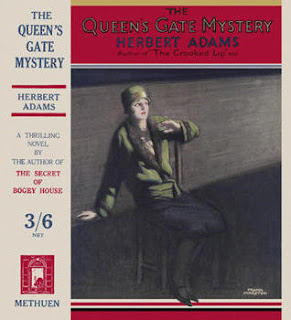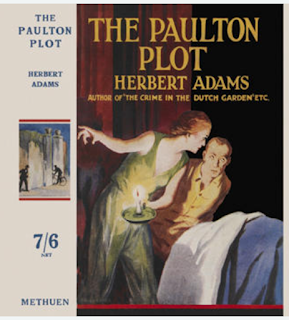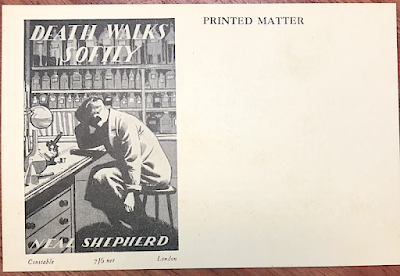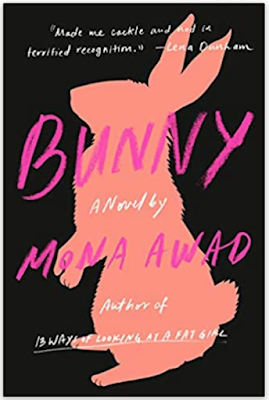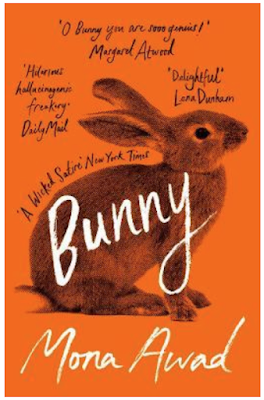The more I read of Brian Flynn the more I realize why he was never recognized or remembered for his work. He just isn’t consistently good. First off, he is a terrible prose stylist in his early books with some awful sentence structures that were screaming out to an editor for a full-on assault of the blue pencil. His page length paragraphs are syntactically irksome, the narrative gets repetitive with redundant “our story thus far” recaps, he uses eccentric vocabulary when plain language will serve better (
vaticinate is a favorite bizarre word choice instead of
foretell or
prognosticate) All of these sins pile up sometimes on the same page and are detrimental to his engaging plots and lively incidents. I’m trying to forgive him for all of this but it’s hard to ignore when an avalanche of verbosity occurs in the most inconvenient places impeding the enjoyment of the story and interrupting the flow of action.
The biggest of his sins, however, is his failure to honor the fair play tradition. The adventures of Anthony Bathurst are overloaded with last minute reveals with nary a clue offered up that relates to that reveal. He indulges in the unfavorable practice of having a character lowering a speaking voice and not recording what is said. In essence they whisper to each other without the benefit of the reader knowing what was said. Similarly, characters write things on pieces of paper rather than openly speaking their ideas once again leaving the reader left out of the action. Makes me boil. Grrr...
One thing I particularly dislike – an indulgence I think Flynn must have thought was uproariously funny – is his habit of taking cliches and aphorisms and rewriting them to make them sound like jokes. I found examples of this annoying gimmick in each one of the books I recently read. To do this in one or two books as an homage to the renowned Mrs. Malaprop, say, would be acceptable. But it happens all the time, in all of his books. Flynn never seems to grow tired of his dubious wordplay. Everyone engages in this paraphrasing of proverbs (a preposterous idea for any fiction writer), including Bathurst himself. I’ve cited several of them in the capsule reviews below.
And yet... somehow I can't get enough of these books! What keeps me reading are Flynn’s inventive plots, his unceasing imagination and his absolute love for the genre. He really does love a mystery. In The Ebony Stag, for example, Bathurst makes an allusion to Monsieur Hanaud, the French detective created by A.E. W. Mason, best known for his star turn in The House of the Arrow. Detective short stories and novels are repeatedly mentioned as often as Flynn’s habit of having Bathurst cite obscure poems and arcane works of literature. Additionally, Flynn was willing to experiment with the form in his later years deviating from the formulae of the traditional Q&A investigation, evidence gathering and clue hunting to try his hand at pulpish thrillers, Grand Guignol horror, inverted detective novels and in one specific book a rather mature handling of the psychological crime novel specifically dealing with a theme later explored by dozens of crime fiction writers– the infection of a crime on an individual's moral character and conscience. Flynn gets better at plotting once he reached the third decade of his career in the 1940s. I only wish he abandoned some of his irksome writing habits as he seemed to mature in other areas like concocting deviously engineered murders, devising unusual motivations and plumbing the depths of murderous minds with trenchant insight.

(1932), 11th book in the series Dislike the heavy-handed metaphor of the title taken from a line that appears in "The Ballad of Reading Gaol" by Oscar Wilde. The line is used an epigraph to the novel. It refers to a prisoner awaiting the "hangman with his gardener’s gloves/Slip[ping] through the padded door." The novel begins with a well-used plot motif – a man wrongfully accused of murder and the desperate fight to get him acquitted at trial. First half of the novel tells the story of the trial and how the defense manages to pull off a miracle. Second half is a murder mystery when a shocking reveal of a second murder victim upends the plot's main thrust.
I pride myself on seeing through the biggest piece of misdirection in this cleverly told story. Flynn breaks a few rules here, almost pulling off a trick worthy of one Agatha Christie’s best mystery novels. But he let his cards show before the final reveal. Fair play clueing is present for some bits, otherwise I’d not have been tipped off. In other areas, however Bathurst delivers some info in the final pages without ever letting the reader know what he was doing. The Stilton cheese business, for example, was utterly unfair but easily could have been dealt with in a subtle and fair manner. There is also some unfair business when the doctor who examines the murder victim gives us details about the time of death. Huge cheat on Flynn’s part that may mislead most readers. This is later explained, but the reason is lazy and lame.
REWRITTTEN APHORISM (spoken by Sir Robert Frant, father of the accused on trial) "There are two ends of the candle, you know, and combustion should only be at work at one of them."
The Ebony Stag (1938), #22 in series This is a splendidly told, exciting mystery. I was pleasantly surprised by the whole thing. Quite the ripping yarn. The story is teeming with Golden Age conventions: a rhyming riddle, lost treasure, secret identities, impostors, a bizarre murder method, a nearly impossible crime in an almost locked room. It’s a real page turner and Flynn’s writing is pretty good in this one. Unfortunately, it gets bogged down towards the end when he resorts to his old bad habits of suspense-killing rambling monologues, ill-timed recapping and a completely pointless tabulation scene the likes of which even Carolyn Wells would shake her head while reading.
But still the good far outweighs the bad here. An elderly retired gentleman is gruesomely murdered by an unknown weapon in his locked cottage. Only a small window was open but the opening was barely big enough to allow entry for a boy who manages to get in and unbolt the door for the gent’s niece. She comes by to check up on her uncle and then must enlist the help of the boy. The figure of the title is found broken by the body. The missing weapon and the reason for the broken stag are pale in comparison to a larger mystery when it is soon discovered that the murdered man is not who everyone thought he was. The story grows ever more intriguing as it progresses. Very much recommended if you’re looking for one of the truly entertaining Anthony Bathurst detective novels.
REWRITTTEN APHORISM (spoken by Bathurst)
“But Hamlet, Prince of Denmark, if you remember, once warned a certain Horatio concerning the possibilities continued in heaven and earth that were omitted from their philosophy.” [So clunky. Not funny at all. Why not just quote the line verbatim? Every other mystery writer quoted that line
ad nauseam throughout the Golden Age.]
There is also a character named Frederick Gulliver Sparke-Lodge in The Ebony Stag who mixes metaphors and speaks in dozens of these mangled proverbs. I’ll spare you any sampling of that nonsense.
Such Bright Disguises (1941), #27 in the series. Bathurst does not appear until the final third of this truly remarkable crime novel. It’s not really a detective novel until the final third when all that preceded is turned on its head with a final double twist that I thought rather brilliant. The bulk of the novel is, in fact, an inverted crime novel and tells the story of two adulterous lovers who plot the murder of the wife’s husband. There are some mysterious elements introduced in the story that make you doubt what you think was almost a certainty. This is part of Flynn’s clever melding of pure detective novel and inverted detective novel. It’s his attempt to write a mystery novel in the style of Francis Iles, I’d say. Crime fiction fans will draw comparisons to
Malice Aforethought,
Payment Deferred by C. S. Forrester,
This Way Out by James Ronald and the works of James M. Cain. They all came to mind as I read Flynn’s book, but one classic work stood out more.
The deeper I plunged into this dark novel the more I was reminded of Thérèse Raquin, one of Emile Zola’s superior crime novels to explore the guilt of adulterous lovers and how after committing and covering up a murder they are doomed to never forget what they’ve done. In Flynn’s novel Lawrence and Dorothy are the duplicitous lovers. As a consequence of their criminal act their desire and lust wither away under the weight of guilt and remorse. Dorothy has nightmares and is literally haunted by the ghost of her husband. Ultimately, they begin to distrust one another and madness and paranoia begin to set in. There is no happy ending here with Flynn delivering a whopper of a surprise in the final pages. Of the handful of Flynn’s novels I’ve read this is his most mature, almost a melodramatic mainstream novel of psychology with crime as a side dish, rather than a crime novel as the main course.
Psychological crime fans, inverted detective novel lovers and anyone looking for a dark and noirish crime story will be thoroughly satisfied with Such Bright Disguises. I’m convinced it is one of Flynn’s finest novels and I’ve only read seven so far.
